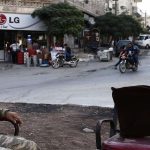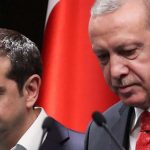By paul Iddon
On February 14, the presidents of Turkey, Russia and Iran met in Russia’s Black Sea resort city of Sochi to once again discuss the Syrian conflict under the framework of the Russian-sponsored Astana Process. They discussed, among other things, “further joint steps with a view to a long-term settlement” to the conflict in Syria that has raged for just under eight years now.
Before the talks, the Turkish government said that the three presidents would seek a “permanent solution” that would stabilize Syria.
Turkey will likely play a major role if either or both of the two major flashpoints in northern Syria spark yet more conflict in the war-torn country.
Last October, Turkey was tasked with dealing with the Hay’at Tahrir al-Sham (HTS) jihadist group, which controls most of the northwestern province of Idlib. Ankara agreed to do this in order to prevent a destructive offensive against HTS by both Russia and the Syrian military, which would likely have displaced millions and created a new humanitarian crisis right on Turkey’s border. However, it has since failed to contain HTS which, this January, managed to expand its control over even more of the province.
In northeast Syria, Turkey has threatened in recent months to attack its foremost enemy in Syria, the Kurdish People’s Protection Units (YPG), which control the entire two-thirds of the Syrian border with Turkey east of the Euphrates River. After U.S. President Donald Trump announced, on December 19, that all U.S. troops there would be withdrawn it seemed Turkey could soon fulfill this goal more easily.
In light of its planned troop withdrawal, Washington proposed a 20-mile-deep safe zone along the border in northern Syria. So far, according to Turkish President Recep Tayyip Erdoğan , little headway has been made toward the establishment of such a zone. Moscow has proposed that Ankara instead reactivate the 1998 Adana Agreement between it and Damascus, which could allow the Turkish military permission to pursue Kurdish fighters 5 km (3 miles) beyond the Syrian border.
Resolving these two issues will be a major step toward bringing the lengthy Syria conflict to an end.
Analysts gave their views on the significance of this latest Sochi meeting to Ahval News.
Timur Akhmetov, a researcher on Russia, Turkey and the Middle East at the Russian International Affairs Council, does not see any “major breakthrough” coming out of this meeting.
“Turkey still insists to keep Idlib from the military operation, whereas Russia has been sending messages that a military operation is not only necessary but could be carried out in accordance to Turkish demands, i.e. without much losses among civilians,” Akhmetov said.
Professor Joshua Landis, a noted Syria expert and Director of Middle East Studies at the University of Oklahoma, pointed out that the three powers welcome the announced U.S. withdrawal from Syria “but beyond that, their disagreements over how to settle the disputed territories of north Syria were glaring,”
“Turkey is still pressing to control a buffer zone inside the length of its Syria border,” he said. “Neither Russia or Iran agree with this, not to mention the Syrian government or the YPG.”
“Syria, Iran and Russia insist that HTS must be removed from Idlib and the province restored to Syrian sovereignty. They insist Turkey has not fulfilled its side of the Sochi agreement to bring the terrorist group to heel.”
Meanwhile, Landis believes the U.S. “seems to ignore the fact that the Syrian army will fill the vacuum its withdrawal will leave in north Syria.
“The Syrian government insists that it does not have to accord the Kurds any real degree of autonomy,” he said.
“All sides continue to resist making real compromises.”
Nicholas Heras, the East Security Fellow at the Center for a New American Security, said that the “biggest obstacle remaining between Turkey, Russia, and Iran is that the Assad government wants Turkey to vacate all of the territories that it currently controls in Syria.”
“Syrian President Bashar al-Assad does not trust Erdoğan’s intentions, and as a result of that reality, the Russians and the Iranians are constrained by the types of deals that they can make,” he said, adding, “Erdoğan may say that he will withdraw Turkish forces from the territories that they have entered in Syria, but Damascus will be wary about any further Turkish moves that could become a permanent presence.”
Heras also explained that while Turkey wants to withdraw from Idlib, where the Turkish Army maintains 12 observation posts throughout the province established under the framework of Astana’s so-called de escalation zones, it “cannot do that because of the risk of mass humanitarian displacement that would result from any Assad offensive on that region.”
As a direct result, Heras said, “Turkey is handcuffed to Idlib.”
Mustafa Gurbuz, a non-resident fellow at the Arab Center in Washington, said the Sochi talks are a “crystal clear” indication of how willing Moscow is “to pressure Ankara, and how Turkey has been foolish in expecting Russia’s support for Turkey’s safe zone east of the Euphrates.”
“Russia has the upper hand now, and unless Turkey delivers on the Idlib front substantially, the negotiations will stall,” he said.
Dr Kerim Has, an analyst on Russia, Turkey and the Middle East, has three main takeaways from the latest talks in Sochi.
“The first critical outcome of the meeting was the agreement among the three guarantors to keep the Astana format alive, even though their conflicting goals are coming to the surface more clearly as the Syrian war nears its end,” he said.
“In the following months, probably and primarily, some Arab and Gulf states like Egypt, Saudi Arabia, and the United Arab Emirates will emerge as observers in Astana summits, which may give new impetus to resolve the Syrian conflict.”
The second noteworthy takeaway Has highlighted was Erdoğan’s interest in potentially reviving the Adana Agreement, which he sees as an indication “that Ankara is inclined to engage in a political dialogue with Damascus soon.”
He consequently predicts that, after the March 31 elections in Turkey, “the Assad regime may again be welcomed by Turkish authorities.”
His third and final takeaway was that Russia and Iran “don’t seem to have given a green-light to Turkey for setting up the 20-mile safe zone in northeastern Syria.”
“Moscow still prioritizes the situation in Idlib, but also wants to have the Assad regime and the Kurds reach a deal and keep its position of pushing Ankara to talk with Damascus as the best way out for new military incursions into Syria,” he said.
Has believes that Moscow is pushing for a reactivation of the Adana Agreement “as the most effective mechanism that Ankara should work to implement for northeastern Syria following the U.S. withdrawal if that happens.”
“But, the Turkish President wants, and obviously needs some time for this. We should wait and see what happens after the elections in Turkey,” he said.
“Since there are currently many ambiguities about the U.S. withdrawal Russia doesn’t want to risk having the Turkish Army launch any offensive into northeastern Syria.”
Following these latest talks, Russian President Vladimir Putin declared that he, Erdoğan, and their Iranian counterpart Hassan Rouhani all agree that U.S. withdrawal from northeast Syria “would be a positive step that would help stabilize the situation in this region, where ultimately the legitimate government should reestablish control.”
The Russian president went on to add that he has not yet seen any signs that indicate the U.S. is preparing to withdraw anytime soon.
Has anticipates that in the latest Sochi meeting the three countries “probably reached another temporary consensus on delaying the Russia-led [Syrian] regime’s large-scale Idlib operation, but I’m not sure that this will work effectively.”
He also anticipates that Moscow has urged Ankara to once again focus on combating HTS in Idlib “in a more effective way” and will likely “push Ankara to facilitate the advance of the Syrian Army into that province in a piecemeal fashion.”
“In any case, Turkey’s possibilities in Idlib are getting shorter now compared to five months ago, when a military operation of Assad regime has been delayed at the last moment with a Sochi deal between Putin and Erdoğan.”
The next time these three presidents conduct another round of Astana talks, according to Putin, will be in late March or early April. These issues, which are inextricably tied to Turkey’s future in northern Syria, are bound to be discussed and negotiated over yet again.
Source: Ahval News



